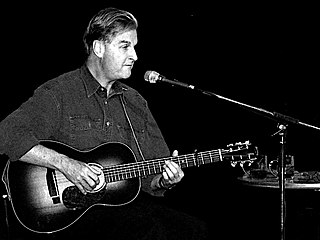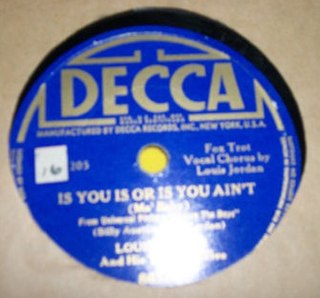
Joseph Vernon "Big Joe" Turner Jr. was an American blues shouter from Kansas City, Missouri. According to songwriter Doc Pomus, "Rock and roll would have never happened without him". Turner's greatest fame was due to his rock and roll recordings in the 1950s, particularly "Shake, Rattle and Roll", but his career as a performer endured from the 1920s into the 1980s.

Mathis James Reed was an American blues musician and songwriter. His particular style of electric blues was popular with a wide variety of audiences. Reed's songs such as "Honest I Do" (1957), "Baby What You Want Me to Do" (1960), "Big Boss Man" (1961), and "Bright Lights, Big City" (1961) appeared on both Billboard magazine's R&B and Hot 100 singles charts.

Johnny Shuggie Otis is an American singer-songwriter, recording artist, and multi-instrumentalist.
John Porter is an English musician and record producer.

Shaun Murphy is an American blues and R&B singer songwriter, best known for her powerhouse singing style. Sometimes credited as Stoney, her recording career started in 1971 with Motown Records.

Aurora "Rory" Block is an American blues guitarist and singer, a notable exponent of the country blues style.

Maria Muldaur is an American folk and blues singer who was part of the American folk music revival in the early 1960s. She recorded the 1973 hit song "Midnight at the Oasis" and has recorded albums in the folk, blues, early jazz, gospel, country, and R&B traditions.

Richard Francis Vito is an American guitarist and singer. He was part of Fleetwood Mac between 1987 and 1991. Vito took over as lead guitarist after Lindsey Buckingham left the group. He is best known for his blues and slide guitar style, whose influences include Elmore James, Robert Nighthawk, B.B. King, Alvino Rey, Les Paul, George Harrison, and Keith Richards.

"Les Sucettes" ("Lollipops") is a French pop song written by Serge Gainsbourg and first recorded by France Gall in 1966. One of Gall's biggest hits, it was an unusually risqué song for its time, containing numerous sexually-charged double-entendres, although she had said that she was unaware of this at the time.

Geoff Muldaur is an American active singer, guitarist and composer, who was a founding member of the Jim Kweskin Jug Band and a member of Paul Butterfield's Better Days.

"It's So Hard" is a song written and performed by John Lennon, which first appeared on his 1971 album Imagine. Shortly after the album's release, the song was issued as the B-side to the single "Imagine". In Mexico, it was released on an EP with "Imagine", "Oh My Love" and "Gimme Some Truth". In 1986, a live performance from 30 August 1972 was issued on Lennon's live album Live in New York City.

"Is You Is or Is You Ain't My Baby" is a song written by Louis Jordan and Billy Austin. The song's first recording, by Jordan, was made on October 4, 1943. It was released as the B-side of a single with "G.I. Jive" with the title "Is You Is or Is You Ain't ". The song reached No. 1 on the US folk/country charts, number two for three weeks on the pop chart, and number three on the R&B chart.
Dirty blues is a form of blues music that deals with socially taboo and obscene subjects, often referring to sexual acts and drug use. Because of the sometimes graphic subject matter, such music was often banned from radio and available only on jukeboxes. The style was most popular in the years before World War II, although it experienced a revival in the early 1950s.
"Big Ten Inch Record", also known as "Big Ten-Inch ", is a rhythm and blues song written by Fred Weismantel. It was first recorded in 1952 by Bull Moose Jackson and released by King Records, originally on 10" vinyl, the most popular format at the time. The song was later covered by Aerosmith and released as part of the 1975 album, Toys in the Attic. It has been rated as one of the best double entendre songs of all time.

Live at Sweetwater Two is a live Hot Tuna album recorded at the same time as the album, Live at Sweetwater, but contains no tracks from the previous release. The live performances feature Bob Weir of the Grateful Dead, blues-singer Maria Muldaur, and keyboardist Pete Sears. Also included is the previously unreleased studio track "Endless Sleep" from the Pair a Dice Found sessions. In 2004 Eagle Records re-mastered and re-released the album with several added tracks, and without the studio track included.

Henry Bernard Glover was an American songwriter, arranger, record producer and trumpet player. In the music industry of the time, Glover was one of the most successful and influential black executives. He gained eminence in the late 1940s, primarily working for the independent King label. His duties included operating as a producer, arranger, songwriter, engineer, trumpet player, talent scout, A&R man, studio constructor, while later in his career he became the owner of his own label. Glover worked with country, blues, R&B, pop, rock, and jazz musicians, and he helped King Records to become one of the largest independent labels of its time. Thanks to the efforts of family, friends and fans, Glover's hometown of Hot Springs, Arkansas celebrated the 100th anniversary of his birth in 2021 by inducting him into the downtown "Walk of Fame," the Mayor's "Proclamation," "Key to the City," and named a parklet "Henry Glover Way," along Black Broadway after him. In 2018, Glover was recognized with a Lifetime Achievement Award by the King Records 75th Anniversary. In 2013, he was inducted into the Blues Hall of Fame.

"Play Something Sweet (Brickyard Blues)" is a composition by New Orleans rhythm and blues singer and songwriter Allen Toussaint which, in 1974, became a top 40 hit for Three Dog Night.
"Big Long Slidin' Thing" is a 1954 rhythm and blues song written by Leroy Kirkland and Mamie Thomas, sung by Dinah Washington, and arranged by Quincy Jones. It has been covered by a number of different artists, and has been rated as one of the best double entendre songs of all time.
"Keep On Churnin' (Till the Butter Comes)" is a rhythm and blues song written by Henry Glover, Jester Hairston, and Lois Mann. It was first recorded in 1952 by Wynonie Harris, with backing from the Todd Rhodes Orchestra, and released by King Records. The song was also recorded by Hank Ballard and the Midnighters. It has been rated as one of the best double entendre songs of all time.
"Drill Daddy Drill" is a dirty blues song, recorded by Dorothy Ellis and released as a single on Federal Records in April 1952. The B-side of the record was "Must Go Out and Play". Both songs were penned by Ravon Darnell and Mario Delagarde. Delagarde was the regular double bass player with Johnny Otis and His Orchestra.














